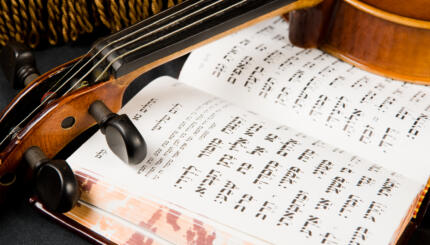The linguistic connection between breath, spirit, and life plays a central role in Jewish theology and prayer. In Hebrew, the word neshama means both breath and soul. Ruach connotes both spirit and wind. These double meanings underline a deeper belief that breath is our life force, animating not only our bodies but our souls.
This idea is reflected in a special benediction recited on Shabbat and major Jewish holidays. Nishmat Kol Chai (literally “the breath of all life”) affirms a shared life force among all of God’s creations, a common breath that not only sustains physical life, but also serves to praise our single Creator.
This prayer is the closing benediction of Pesukei d’Zimra, the verses of song that are meant to spiritually prepare us for the heart of our morning prayers. The structure of the prayer is threefold: 1) affirming God’s universal sovereignty and power of salvation; 2) admitting the human inability to offer sufficient praise to God; and 3) reiterating God’s unparalleled power and our responsibility to offer prayer in response.
The prayer begins with this line: “The soul/breath of every living being will praise you, and the spirit of every mortal being will always glorify and extol You, our King.” Nishmat Kol Chai does not begin from a place of Jewish, or even human particularity, but with a profoundly universal assertion: all living creatures are united by breath. And it continues in this expansive tone: “We have no King but You, God of the first and the last, God of all creatures, master of all generations, glorified through great praise, who treats the world with love and all creatures with compassion.”
With your help, My Jewish Learning can provide endless opportunities for learning, connection and discovery.
The second section uses the metaphor of the human body to express the human inability to adequately praise God. “Even if our mouths were filled with song like the sea, and our tongues with joy like the sea’s many roaring waves, and our lips with praise like the wide expanse of the sky, and even if our eyes shone like the sun and the moon and even if our hands were spread wide like the eagles in the sky, even if our feet were light like gazelles, we would be unable to adequately acknowledge you with thanks.” This section takes pains to emphasize how limited we are in understanding or articulating the full glory of God’s existence and power.
According to Bible scholar Marc Zvi Brettler, assertions of this kind are rare in the Hebrew Bible. The Book of Psalms, for example, is full of attempts to adequately praise the Divine. Only the Book of Job, he notes, focuses strongly on the human limits of understanding and expression. This section also narrows the narrative scope, talking about the specific miracles God has performed for the Jewish people, including the exodus from Egypt and the kindnesses shown to our ancestors in evading plagues and surviving famines.
Nishmat Kol Chai concludes by imploring us to use every limb of our body to praise God to the best of our limited ability — even as it reminds us of God’s peerless power and majesty: “Who is like You? Who is equal to You? Who can be compared to You? O great, mighty and awesome God, God most high, maker of heaven and earth. We will laud, praise and glorify You and bless Your holy name.”
This threefold structure of this prayer serves as a gateway between the warm-up prayers of Pesukei d’Zimra, and the heavy lifting of the morning service — the recitation of the Shema and Amidah, which is mandated by Jewish law. Nishmat Kol Chai focuses our attention on the unifying life force of breath, which is also our primary vehicle to praise God. It reminds us of the great miracles of creation and redemption, and of God’s everlasting presence in our lives. But it also sets realistic expectations about our ability to praise a Divine force that is incomparable and beyond our comprehension.
Rabbi Elliot Dorff makes an important point about Nishmat Kol Chai’s humbling words. Acknowledging the limits of our praise does not mean that we are eternally lost, lacking, or worthless. Our need for God’s love and fidelity, and God’s constant supply of both, is what creates the Divine bond that gives our lives meaning. He writes: “God’s relationship to us lends our lives value. This notion contrasts sharply with some Christian (Augustininan and Calvinist) conceptions of human beings as being hopelessly depraved from the moment of birth (tainted with original sin), unable to earn salvation through deeds, and unworthy to be saved by God. Only faith in Jesus can save, and (in Calvinism) even that will save just the elect few. For Jews, by contrast, our lack of merit is balanced by our ongoing relationship with God, who values us.”
Nishmat Kol Chai reminds us of our limited capacity to understand God’s wisdom in its totality or to articulate the mysteries of the world, but it does not doom us to darkness. Rather, our need for God, and God’s appreciation of our heartfelt and full-bodied praise, provide the basis for a relationship that provides meaning, structure, and value to our lives as divine creations, human beings, and Jews.



